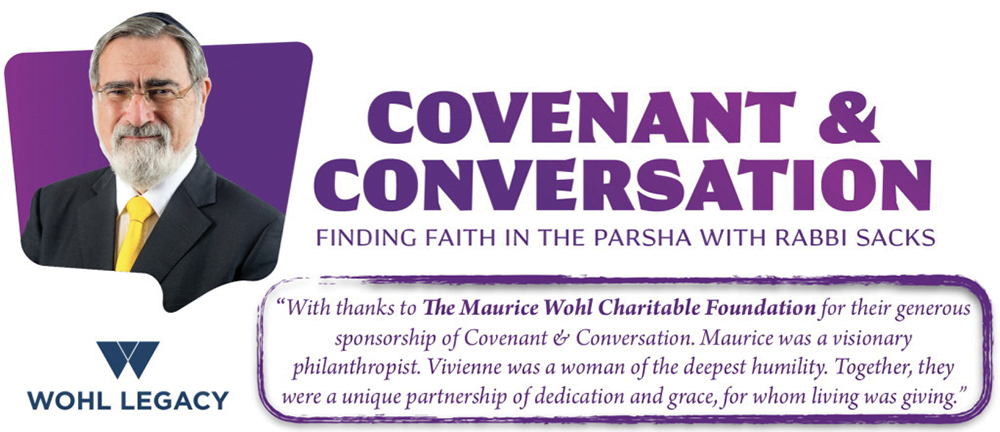
Listen to these words that are among the most fateful and reverberating in all of Jewish history:
“Joseph recognised his brothers, but they did not recognise him.” (Gen. 42:8)
The Torah is a deep book. We make a great mistake if we think it can be understood on a superficial level.
On the surface, the story is simple. Envious of him, Joseph’s brothers initially planned to kill him. Eventually they sell into slavery. He is taken to Egypt. There, through a series of vicissitudes, he rises to become Prime Minister, second only, in rank and power, to Pharaoh.
It is now many years later. His brothers have come to Egypt to buy food. They come before Joseph, but he no longer looks like the man they knew many years before. Then, he was a seventeen year old called Joseph. Now he is thirty-nine, an Egyptian ruler called Tzofenat Paneach, dressed in official robes with a gold chain around his neck, who speaks Egyptian and uses an interpreter to communicate with these visitors from the land of Canaan. No wonder they did not recognise him, though he recognised them.
But that is only the surface meaning. Deep down the book of Bereishit is exploring the most profound source of conflict in history. Freud thought the great symbol of conflict was Laius and Oedipus, the tension between fathers and sons. Bereishit thinks otherwise. The root of human conflict is sibling rivalry: Cain and Abel, Isaac and Ishmael, Jacob and Esau, and now Joseph and his brothers.
Joseph has the misfortune of being the youngest. He symbolises the Jewish condition. His brothers are older and stronger than he is. They resent his presence. They see him as a trouble maker. The fact that their father loves him only makes them angrier and more resentful. They want to kill him. In the end they get rid of him in a way that allows them to feel a little less guilty. They concoct a story that they tell their father, and they settle down to life again. They can relax. There is no Joseph to disturb their peace any more.
And now they are facing a stranger in a strange land and it simply does not occur to them that this man may be Joseph. As far as they are concerned, there is no Joseph. They don’t recognise him now. They never did. They never recognised him as one of them, as their father’s child, as their brother with an identity of his own and a right to be himself.
Joseph is the Jewish people throughout history.
Joseph recognised his brothers, but they did not recognise him.
Judaism was the world’s first monotheism but not the last. Two others emerged claiming descent, literal or metaphorical, from Abraham, Christianity and Islam. It would be fair to call the relationship between the three Abrahamic monotheisms, one of sibling rivalry. Far from being of mere antiquarian interest, the theme of Bereishit has been the leitmotiv of the better part of the last two thousand years, with the Jewish people cast in the role of Joseph.
There were times — early medieval Spain was one — when Joseph and his brothers lived together in relative harmony, convivencia as they called it. But there were also times — the blood libels, the accusations of poisoning wells or spreading the plague — when they sought to kill him. And others — the expulsions that took place throughout Europe between the English in 1290 and the Spanish in 1492 — when they simply wanted to get rid of him. Let him go and be a slave somewhere else, far from here.
Then came the Holocaust. Then came the State of Israel, the destination of the Jewish journey since the days of Abraham, the homeland of the Jewish people since the days of Joshua. No nation on earth, with the possible exception of the Chinese, has had such a long association with a land.
The day the State was born, 14 May 1948, David Ben Gurion, its Prime Minister, sought peace with its neighbours, and Israel has not ceased seeking peace from then until now.
But this is no ordinary conflict. Israel’s opponents — Hamas in Gaza, Hezbollah in Lebanon, President Mahmoud Ahmadinejad of Iran, are not engaged in a border dispute, these boundaries or those. They deny, as a matter of non-negotiable religious — not just political — principle, Israel’s right to exist within any boundaries whatsoever. There are today 56 Islamic states. But for Israel’s neighbours a single Jewish state the size of Wales is one too many.
Joseph recognised his brothers, but they did not recognise him.
There is no state among the 192 member nations of the United Nations whose very existence is called into question this way. And while we as Jews argue among ourselves as to this policy or that, as if this were remotely relevant to the issue of peace, we fail to focus on the real issue, which is, so long as Joseph’s brothers do not recognise his right to be, there can be no peace, merely a series of staging posts on the way to a war that will not end until there is no Jewish state at all.
Until the sibling rivalry is over, until the Jewish people wins the right to be, until people –—including we ourselves —realise that the threat Israel faces is ultimate and total, until Iran, Hamas and Hezbollah agree that Jews have a right to their land within any boundaries whatsoever, all other debate is mere distraction.










